Capability - NASUWT
Capability - NASUWT
Capability - NASUWT
You also want an ePaper? Increase the reach of your titles
YUMPU automatically turns print PDFs into web optimized ePapers that Google loves.
Teacher capability/competence<br />
A review of the evidence<br />
<strong>NASUWT</strong><br />
The Teachers’ Union<br />
The largest teachers’ union in the UK
Background<br />
In 2010, the issue of capability/competence procedures being used<br />
inappropriately in schools and colleges was highlighted as a major issue by the<br />
<strong>NASUWT</strong> at its national Annual Conference, based on feedback from members<br />
and representatives. The <strong>NASUWT</strong> National Executive commissioned research into<br />
the problem to examine the number and type of capability cases and the factors<br />
surrounding the use of capability/competence procedures in schools. 1<br />
Aims and methodology<br />
The research examined:<br />
• the extent to which capability/competence procedures are used;<br />
• the reasons for their use;<br />
• the experiences of teachers in relation to the use of capability/competence<br />
procedures.<br />
This report is based upon a review of evidence regarding the use of<br />
capability/competence procedures in UK schools drawing on the following<br />
datasets:<br />
• cases referred to the General Teaching Councils in England, Northern Ireland,<br />
Scotland and Wales;<br />
• data from local authorities in England;<br />
• data from the <strong>NASUWT</strong> statistical database.<br />
Additionally, the research also explored the perceptions and experiences of almost<br />
100 teachers who had experience of capability/competence procedures in<br />
schools. This aspect of the research allowed for a consideration of how the<br />
experience of capability/competence procedures was mediated by gender, ethnic<br />
and disability status characteristics.<br />
Teacher capability/competence in context<br />
The problem of capability/competence in schools has been the subject of a great<br />
deal of heated debate, often based on scant empirical evidence. Public interest<br />
in the issue of teacher competence came to prominence in 1995 when Her<br />
Majesty’s Chief Inspector of Schools, Chris Woodhead, claimed that there were<br />
1 Annex 1: Resolution of <strong>NASUWT</strong> Annual Conference 2010: <strong>Capability</strong> Proceedings.<br />
3
around 15,000 incompetent teachers, or around 5% of the teacher workforce,<br />
working in schools. In 2008, Keith Bartley, Chief Executive of the General<br />
Teaching Council for England (GTCE) claimed there were around 17,000<br />
‘substandard’ teachers in classrooms. However, neither claim was backed up by<br />
robust empirical data.<br />
The BBC One Panorama programme 2 broadcast in 2010, using data that<br />
confirmed that 18 teachers had been ‘struck off’ the UK teaching registers in the<br />
last 40 years on grounds of incompetence, 3 argued that this statistic proved that<br />
incompetent teachers are an endemic feature of the UK school system.<br />
The BBC claimed that ‘some bad teachers are moved between schools, rather than<br />
having their competency challenged…they are being given good references in<br />
exchange for agreeing to look for work in alternative schools.’ 4<br />
The BBC went further and argued:<br />
‘Some believe part of the problem lies with headteachers’ unwillingness<br />
to subject those suspected of incompetence to proper competence tests,<br />
referring those found wanting to the GTC.’<br />
However, a report for the GTCE argues strongly that the problem surrounding the<br />
nature and extent of capability issues in schools is rooted in inconsistent<br />
management practices at school level, which deny teachers access to the support<br />
and development they might benefit from and which makes it difficult to reach<br />
hard and fast conclusions about the problem:<br />
‘The study findings strongly suggest that there are a number of<br />
inconsistencies in the way these procedures are interpreted and applied<br />
that may influence whether or not a case reaches the point at which a<br />
referral to the GTC is appropriate and therefore affect the patterns of<br />
referrals to the GTC...At the earliest stage where a concern about a<br />
teacher’s or headteacher’s performance may first be recognised, there are<br />
identified barriers. These are rooted in inconsistencies in schools’ overall<br />
approaches to managing performance…as well as uncertainty about what<br />
constitutes a performance issue, the quality of information used to assess<br />
performance, and the influence of the relationship between the teacher<br />
or headteacher about whose performance there are concerns and senior<br />
2<br />
Panorama, ‘Can I Sack Teacher?’ BBC One, Monday, 5 July 2010 at 2030BST.<br />
3<br />
The BBC data indicate that teachers ‘struck off’ on incompetence grounds by nation were: England – 13;<br />
Wales – 3; Scotland – 2; Northern Ireland – 0. (www.bbc.co.uk/news/10464617 Accessed March 2010).<br />
4<br />
www.bbc.co.uk/news/10464617 Accessed March 2010.<br />
4
staff/governors. Where performance issues are identified, there is variation<br />
in the types of supportive interventions offered by schools and in how<br />
these are received by individuals and differences in the outcomes of these<br />
interventions, specifically, whether or not the performance issue is<br />
successfully addressed and therefore whether or not local capability<br />
procedures are considered.’ 5<br />
The research for the GTCE confirmed that the profile of incompetence case<br />
referrals to the GTCE is not consistent geographically:<br />
Levels of referrals to the GTCE for incompetence 6<br />
(June 2001 to September 2008)<br />
Number of referrals made<br />
Number of local authorities<br />
(N = 150)<br />
Ever referred for incompetence 61<br />
1 35<br />
2 13<br />
3 4<br />
4 3<br />
5 or more 6<br />
Never referred for incompetence 89<br />
Total 150<br />
The NatCen research concludes:<br />
‘The study has…demonstrated that there is considerable variation in the way capability<br />
procedures are interpreted and applied. There are differences in their interpretation<br />
as primarily supportive or disciplinary procedures and in judgements about the extent<br />
to which they are repetitious of action undertaken through the performance<br />
management system. In turn, these interpretations influence the application of the<br />
procedures, which differ in their formality, the information supplied to teachers<br />
throughout, and their overall duration and the length of particular stages.’ 7<br />
5<br />
NatCen (2010) Factors contributing to the referral and non-referral of incompetence cases to the GTC, GTCE,<br />
p70.<br />
6<br />
NatCen (2010) ibid, p79.<br />
7<br />
NatCen (2010) ibid, p71.<br />
5
Understanding teacher competence and capability<br />
<strong>Capability</strong> and competence procedures exist to provide intensive support and<br />
development for teachers and headteachers/principals who are exhibiting signs<br />
of poor performance. However, there has been a long-standing professional<br />
concern that capability and competence procedures are used inappropriately by<br />
schools, that there is a lack of consistency of practice across all schools and that<br />
the process is loaded against the teacher and used by schools as a means of<br />
getting rid of teachers. Indeed, delegates representing UK teachers at the<br />
<strong>NASUWT</strong> Annual Conference in 2010 identified an ‘apparent increase in the use<br />
of capability procedures in schools and colleges’ and agreed that ‘external<br />
pressures’ operated as ‘the key drivers’ of this increase. The Union’s Conference<br />
confirmed its view that capability procedures ‘appear to be used as a tool to bully<br />
some teachers, particularly those in the latter stages of their teaching careers.’ 8<br />
Research undertaken on behalf of the Department for Education and Skills (DfES)<br />
in 2002 found that ‘There were divergent views about what constituted a capable<br />
teacher and some concern that differential standards might be operating.’ 9 A<br />
decade later, concerns remain about how well managers in schools recognise,<br />
understand and address capability/competence matters. 10<br />
Employers/governing bodies in England and Wales are required in law 11 to have<br />
procedures to deal with teacher capability and competence issues. Schools in<br />
England must also comply with the <strong>Capability</strong> procedures for teachers guidance. 12<br />
The statutory guidance provides a model procedure and time limits for the<br />
management of capability procedures, which allow for an upper limit of two terms<br />
for the formal assessment of staff capability. In particularly serious cases,<br />
capability proceedings may be completed in as little as four weeks.<br />
For teachers in England and Wales, a framework of professional standards,<br />
underpinned by statutory provisions in the School Teachers’ Pay and Conditions<br />
Document (STPCD), also exists.<br />
8<br />
<strong>NASUWT</strong> (2010) Conference Resolution: ‘<strong>Capability</strong> Proceedings’.<br />
9<br />
Manchester School of Management, Research Report No. 312, Best Practice in Undertaking Teacher<br />
<strong>Capability</strong> Procedures, DfES, London, 2002. www.education.gov.uk/publications/standard/<br />
publicationdetail/page1/RR312.<br />
10 NatCen (2010) op cit.<br />
11 The School Staffing (England) Regulations 2009 and the Staffing of Maintained Schools (Wales) Regulations<br />
2006.<br />
12 DfE, <strong>Capability</strong> procedures for teachers, DfEE, London, 2000.<br />
6
In addition, the four UK General Teaching Councils each have their own codes of<br />
conduct that cover teacher professional competence. 13 Whilst each of the GTC<br />
codes articulates teacher competence and capability in their own way, 14 each<br />
definition centres on the need for:<br />
• quality of teaching practice;<br />
• pupil wellbeing, equality and diversity;<br />
• professionalism and teamwork;<br />
• honesty and integrity;<br />
• upholding public trust and confidence in the teaching profession.<br />
The array of definitions and descriptors of teacher capability makes navigating<br />
this area difficult. For example, in England, 64 professional conduct descriptors<br />
are included in the GTCE Code, notwithstanding the plethora of professional<br />
standards described in the STPCD. This can be a source of considerable confusion<br />
in terms of the debate and management of competence/capability practice.<br />
The use of capability/competence proceedings in schools<br />
(i) GTC data<br />
In England, Scotland and Wales, employers of teachers have a legal obligation to<br />
refer serious cases of teacher incompetence to the relevant GTC where an employer<br />
has ceased to use a teacher’s services on grounds relating to their professional<br />
incompetence or where they might have ceased to use a teacher’s services on such<br />
a ground had the teacher not ceased to provide those services. 15 There is no similar<br />
requirement in Northern Ireland for employers to report cases to the GTCNI.<br />
13 General Teaching Council for England (GTCE), Code of Conduct and Practice for Registered Teachers, GTCE,<br />
Birmingham, 2010. www.gtce.org.uk/documents/publicationpdfs/code_of_conduct_1009.pdf.<br />
General Teaching Council for Wales (GTCW) Code of Professional Conduct and Practice for Registered<br />
Teachers, GTCW, Cardiff, 2010. www.gtcw.org.uk/gtcw/index.php/en/professional-standards/revisedprofessional-code.<br />
General Teaching Council for Northern Ireland (GTCNI), Code of Values and Professional Practice, GTCNI,<br />
Belfast, 2004. www.gtcni.org.uk//index.cfm/area/information/page/codeofvaluesandprofessionalpractice<br />
General Teaching Council for Scotland (GTCS), Code of Professionalism and Conduct, GTCS, Edinburgh,<br />
2008. www.gtcs.org.uk/copac.<br />
GTCS, Code of Practice on Teacher Competence, Scottish Negotiating Committee for Teachers (SNCT)<br />
Handbook of Conditions of Service, October 2009. www.snct.org.uk/wiki/index.php?title=Appendix_2.12<br />
14 See Annex 2 for summary of provisions of UK GTC Codes.<br />
15 The General Teaching Council for England (Disciplinary Functions) Regulations 2001 (as amended).<br />
www.legislation.gov.uk/uksi/2001/1268/made.<br />
The General Teaching Council for Wales (Disciplinary Functions) (Amendment) Regulations 2001 (as<br />
amended). www.legislation.gov.uk/wsi/2001/1424/contents/made.<br />
Teaching Council (Scotland) Act 1965 (as amended). www.legislation.gov.uk/ukpga/1965/19/contents.<br />
7
Data published by the GTCE in September 2010 reveals that, since it began hearing<br />
cases in June 2001, 201 cases have been referred by employers to them for alleged<br />
incompetence, out of which 75 (37%) merited further consideration. Where serious<br />
professional incompetence has been found, the GTCE has issued 13 prohibition orders,<br />
one suspension order, 11 suspension orders with conditions, 26 conditional<br />
registration orders, and six reprimands. The GTCE found in favour of the teacher in<br />
18 (24%) cases, in which there was no finding of serious professional incompetence. 16<br />
Legislation has not yet been brought forward to enable the GTCNI to take<br />
disciplinary action in cases where it is alleged that a registered teacher is guilty of<br />
unacceptable professional conduct or serious professional incompetence. Therefore,<br />
there are no official national-level data on teacher capability/competence.<br />
The General Teaching Council for Scotland (GTCS) has removed five teachers from<br />
the register on grounds of serious professional incompetence since it began hearing<br />
competence cases in 2007. In 2010, one teacher was removed from the register,<br />
which represents 0.4% of the total of 265 cases referred in that year for all reasons.<br />
The General Teaching Council for Wales (GTCW) has investigated three employerreferred<br />
allegations of serious professional incompetence since it was created in<br />
2000. Cases of professional incompetence represent one per cent of the total<br />
241 cases received for all reasons by the GTCW between summer 2000, when it<br />
started hearing cases, and summer 2010. Two thirds of the total cases received<br />
have led to no action being taken against the registered teacher. However, in over<br />
50 instances, a disciplinary order, ranging from a reprimand to removal from the<br />
teaching register, has been imposed. 17<br />
(ii) Data from employers<br />
In November 2010, the Times Educational Supplement (TES) published articles 18<br />
based on data from the results of Freedom of Information (FOI) Act disclosures<br />
from local authorities in England. 19 The TES data covers 123 of England’s 152<br />
16 GTCE, Joint research on competence referrals: Updated, GTCE, Birmingham, 20 Sep 2010.<br />
www.gtce.org.uk/media_parliament/news_comment/competence_refer250210.<br />
17 GTCW, Teaching Wales, Edition 22, Ten years on: regulating the teaching profession, GTCW, Cardiff, Summer<br />
2010. www.gtcw.org.uk/gtcw/index.php/en/publications/teaching-wales.<br />
18 Maddern, K. TES, TES Investigation, 12 November 2010. www.tes.co.uk/article.aspx?storycode=6063018<br />
Maddern, K. TES, Failing teachers left in post by half LAs, 12 November 2010.<br />
www.tes.co.uk/article.aspx?storycode=6062985.<br />
Wiliam, Prof. D. TES, Bad teachers are not a big problem – but fire the stubborn non-improvers, 12 November<br />
2010. www.tes.co.uk/article.aspx?storycode=6063019.<br />
19 Maddern, K. TES Freedom of Information Act database of capability cases reported by local authorities in<br />
England, provided to the <strong>NASUWT</strong> on 29 November 2010.<br />
8
local authorities (or 81% of the total), and provides a highly informative picture<br />
of the extent to which employers have identified teacher competence/capability<br />
issues. It is interesting to note, however, that one in five local authorities failed<br />
to provide data in response to the FOI request.<br />
The FOI disclosures made to the TES revealed that 3,633 teachers had been<br />
subject to capability/competence proceedings over a five-year period between<br />
2005 and 2010. Of these:<br />
• 273 (7.5%) had been dismissed or had left the school by mutual consent;<br />
• 151 (4%) had been referred to the GTC;<br />
• 557 (15%) had resigned their posts;<br />
• 19 (0.5%) had moved to a new school; and<br />
• 369 (10%) had improved their performance following competency<br />
proceedings.<br />
The TES evidence confirmed the conclusions reached by the NatCen (2010) report<br />
for the GTCE cited above – namely, there are significant geographical variations<br />
in the use of teacher capability/competence proceedings. The TES results show<br />
that West Sussex launched the highest number of cases, with 409 over the past<br />
five years. However, the TES data indicate that only six of the competency<br />
proceedings initiated by West Sussex resulted in a dismissal and only one case<br />
was referred to the GTCE.<br />
The local authorities recording the lowest number of capability/competence cases<br />
according to the TES evidence were Hampshire, Middlesbrough, Rotherham,<br />
Somerset and Telford, which all reported that just one teacher went through<br />
official proceedings in the last five years. According to the TES evidence, in 59%<br />
of those local authorities responding to the TES FOI request, no teachers had<br />
been dismissed.<br />
The TES research examined the reasons given by local authorities for invoking<br />
competency procedures. The main reasons cited by local authorities were:<br />
• lack of pupil progress;<br />
• unsatisfactory Ofsted inspections (in the case of headteachers);<br />
• poor relationships with children;<br />
• conduct at meetings;<br />
• teachers being unwilling to ‘move with the times’.<br />
9
According to the TES data, the average age of teachers who were dealt with under<br />
capability or competence procedures was 46 years.<br />
A table indicating the number of capability cases disclosed by individual local<br />
authorities who responded to the TES FOI request is presented in Annex 3 of this<br />
report.<br />
(iii)Trade union data<br />
Between 2008 and 2010, the <strong>NASUWT</strong> provided professional casework support<br />
to 773 teachers in the UK in relation to capability and competence issues. The<br />
Union’s casework database provides further confirmation of the geographical<br />
variability in the use of capability/competence proceedings.<br />
Profile of capability/competence casework<br />
Country No. of cases Percentage (%) of cases<br />
England 533 68.9%<br />
Northern Ireland 1 0.1%<br />
Scotland 234 30.3%<br />
Wales 5 0.7%<br />
The <strong>NASUWT</strong> database suggests that capability/competence proceedings are<br />
initiated disproportionately with teachers aged over 50 years, who represented<br />
46% of all capability/competence cases dealt with by the Union. Such teachers<br />
comprise around 32% of the UK teacher workforce and only 19% of the <strong>NASUWT</strong><br />
membership. 20 10<br />
20 All UK teacher workforce data in this report is based upon the following sources:<br />
GTCE, Annual Digest of Statistics 2009-10 Profiles of Registered Teachers in England August 2010, GTCE,<br />
Birmingham, 2010. www.gtce.org.uk.<br />
GTCNI, Digest of Statistics 2009, GTCNI, Belfast, 2009. www.gtcni.org.uk.<br />
GTCS, Statistical Digest: Autumn 2010, GTCS, Edinburgh, 2010. www.gtcs.org.uk.<br />
GTCW, Annual Statistics Digest March 2010, GTCW, Cardiff, 2010.<br />
www.gtcw.org.uk/gtcw/index.php/en/publications/teacher-statistics.<br />
DfE: School Workforce in England (Table D4: Full-time regular qualified teachers in local authority maintained<br />
schools by sector, grade, age and gender: March 2009), January 2010.<br />
www.education.gov.uk/rsgateway/DB/SFR/s000927/index.shtml.
50%<br />
40%<br />
30%<br />
20%<br />
10%<br />
0%<br />
<strong>Capability</strong>/competence cases by age group (2008-2010)<br />
46%<br />
32%<br />
28% 26%<br />
22%<br />
22%<br />
18%<br />
6%<br />
30 or under 31 to 40 41 to 50 Over 50<br />
n % of capability/competence case n % of teacher workforce<br />
A disproportionately high number of male teachers in the UK required casework<br />
support from the <strong>NASUWT</strong> in comparison to women, with two fifths (42%) of<br />
the teachers provided with casework support in capability/competence cases<br />
being male. Men comprise around 34% of the UK teacher workforce 21 and only<br />
28% of the <strong>NASUWT</strong> membership.<br />
The proportion of capability/competence proceedings initiated for black and<br />
minority ethnic (BME) teachers was 6.5%, broadly in line with the estimated<br />
representation of BME teachers in the UK teacher workforce. 22<br />
The proportion of capability/competence cases involving disabled teachers was<br />
9%, massively disproportionate to the representation of disabled teachers within<br />
the UK teacher workforce (0.3%). 23<br />
Teachers’ experiences of capability/competence procedures<br />
The <strong>NASUWT</strong> sought the views of teachers who had been subject to<br />
capability/competence proceedings in order to shed light on their perceptions<br />
and experiences. Whilst the sample of teachers who provided feedback was not<br />
intended to be statistically representative, it does raise a number of important<br />
issues for schools’ use of capability/competence processes.<br />
Around half of the teacher sample (47%) felt that they had been threatened with<br />
being placed on capability/competence procedures during their teaching career.<br />
‘The senior management wanted to force me out of the job in order to cut costs.’<br />
Teacher and head of department<br />
21 GTCE, op cit.<br />
22 GTCE, op cit.<br />
23 GTCE, op cit.<br />
11
‘Two long-serving colleagues in my school have been forced out of teaching<br />
in their late 50s by the use of capability procedures leading to long-term<br />
sickness absence leading to dismissal.’<br />
Secondary school teacher<br />
‘The capability procedure was initiated without any formal consultation or<br />
warning. It was effectively management bullying…The Union was very supportive<br />
but in the end I had to resign from my role. The whole process was traumatic.’<br />
Primary school teacher<br />
‘<strong>Capability</strong> initiated while awaiting surgery for disability-related illness.<br />
Having successfully achieved all targets set (100%), [I] was subjected to<br />
further formal monitoring…However, all further observations/monitoring were<br />
completely successful.’<br />
Disabled teacher<br />
According to teachers themselves, the most common reasons cited by employers<br />
for initiating capability/competence proceedings were:<br />
• performance management outcomes;<br />
• sickness absence;<br />
• professional performance/competence;<br />
• behaviour/class management;<br />
• long or short-term health issues (physical and mental), e.g. menopause, stress,<br />
pregnancy;<br />
• examination results; and<br />
• disability-related (physical or mental).<br />
However, teachers saw the experience of capability/competence proceedings very<br />
differently; they interpreted the actions of their employers as being driven by:<br />
• bullying/harassment;<br />
• staff restructuring/financial imperatives;<br />
• victimisation (following grievances against the school leadership);<br />
• discrimination (particularly on grounds of age, disability and ethnicity).<br />
‘…I had been severely and repeatedly bullied before I was threatened with<br />
capability procedures by external and internal senior managers. It affected<br />
my health detrimentally and my career although I had and have since the<br />
awful experience maintained an impeccable and outstanding track record. I<br />
will never regain that year of my life...’<br />
Secondary school teacher<br />
12
‘Despite successfully achieving 100% of the targets set and maintaining the<br />
achieved standard, I was still subjected to subsequent formal monitoring. This<br />
was contrary to the Performance Monitoring Policy agreed by the LEA and<br />
Union.’<br />
Secondary school teacher<br />
CONCLUSION<br />
The issue of teacher competence has and is likely to remain an issue of continued<br />
interest and debate. However, the veracity of the evidence around the issue has<br />
been limited and there remains a real concern that estimates of the number of<br />
‘incompetent’ teachers remain massively wide of the mark.<br />
The available evidence from a range of sources explored in this Report confirms<br />
that the use of capability/competence proceedings varies between different<br />
geographical areas. The reasons for these statistical variations merits further<br />
examination.<br />
The disproportionate application of capability/competence proceedings in<br />
relation to older teachers, male teachers and disabled teachers is identified<br />
strongly in this review of evidence. The reasons for these differences need to be<br />
better understood. Furthermore, there is some concern that capability/<br />
competence proceedings may be used in some schools to target, victimise or<br />
discriminate against individuals on the grounds of the teacher’s personal<br />
characteristics. This clearly suggests that how school managers understand and<br />
interpret teacher capability/competence may be strongly affected by factors<br />
outside the individual teacher’s control.<br />
Teachers’ perceptions of the negative and inappropriate use of<br />
capability/competence procedures appear to be borne out by this report and this<br />
should raise some concern about how school managers are equipped to manage<br />
and support the performance and competence of employees. The issue of how<br />
school managers are held to account, therefore, for their actions in relation to<br />
the management of capability/competence is likely to be a growing issue for the<br />
future, particularly as more schools seek to acquire greater levels of independence<br />
and autonomy.<br />
13
Annex 1<br />
Resolution of <strong>NASUWT</strong> Annual Conference 2010<br />
CAPABILITY PROCEEDINGS<br />
Conference notes with alarm the apparent increase in the use of capability<br />
procedures in schools and colleges.<br />
Conference believes that external pressures on schools and colleges are the key<br />
drivers of such an increase.<br />
Conference is concerned that these procedures appear to be used as a tool to<br />
bully some teachers, particularly those in the latter stages of their teaching<br />
careers.<br />
Conference instructs the National Executive to:<br />
i. conduct urgent national research into the number and type of capability<br />
cases;<br />
ii. provide training courses specifically to support casework officers who assist<br />
members undergoing capability procedures;<br />
iii. take appropriate action to support members so affected and the caseworker<br />
officers who advise them and<br />
iv. report the findings to Conference 2011.<br />
14
Annex 2<br />
Summary of UK GTC definitions of teacher competence<br />
England<br />
The General Teaching Council for England (GTCE) Code of Conduct and Practice<br />
for Registered Teachers contains nine core values and 64 conduct descriptors of<br />
the following eight principles for teachers to adhere to:<br />
1. Put the wellbeing, development and progress of children and young people first.<br />
2. Take responsibility for maintaining the quality of their teaching practice.<br />
3. Help children and young people to become confident and successful learners.<br />
4. Demonstrate respect for diversity and promote equality.<br />
5. Strive to establish productive partnerships with parents and carers.<br />
6. Work as part of a whole-school team.<br />
7. Co-operate with other professional colleagues.<br />
8. Demonstrate honesty and integrity and uphold public trust and confidence<br />
in the teaching profession.<br />
Northern Ireland<br />
The General Teaching Council for Northern Ireland (GTCNI) Code of Values and<br />
Professional Practice sets out nine core values which underpin ten dimensions of<br />
professional behaviour which require registered teachers to:<br />
1. maintain professional relationships with pupils/learners;<br />
2. acknowledge and respect the uniqueness, individuality and specific needs of<br />
pupils;<br />
3. aim to motivate and inspire pupils with a view to helping each realise his/her<br />
potential;<br />
4. work with colleagues and others to create a professional community that<br />
supports the social, intellectual, spiritual/moral, emotional and physical<br />
development of pupils;<br />
5. promote collegiality among colleagues;<br />
6. co-operate, where appropriate, with professionals from other agencies in the<br />
interests of pupils;<br />
15
7. ensure that relationships with the parents, guardians or carers of pupils;<br />
8. respect confidential information relating to pupils or colleagues;<br />
9. as reflective practitioners, contribute to the review and revision of policies<br />
and practices; and<br />
10. in keeping with the concept of professional integrity, assume responsibility<br />
for their ongoing professional development.<br />
Scotland<br />
The General Teaching Council for Scotland (GTCS) Code of Professionalism and<br />
Conduct has 23 conduct descriptors aligned to the following four principles and<br />
values required of all registered teachers in Scotland:<br />
1. Professionalism and maintaining trust in the profession.<br />
2. Professional responsibilities towards pupils.<br />
3. Professional competence – requiring teachers to maintain and develop their<br />
professional knowledge, skills and practice to ensure they continue to meet<br />
the requirements of the Standard for Full Registration.<br />
4. Professionalism towards colleagues and parents.<br />
Wales<br />
The General Teaching Council for Wales (GTCW) Code of Professional Conduct<br />
and Practice for Registered Teachers sets out the key principles of good conduct<br />
and practice for registered teachers in Wales. The Code contains 33 conduct<br />
descriptors aligned to seven key principles of professional conduct and practice<br />
which require registered teachers to:<br />
1. base their relationship with pupils on trust and respect;<br />
2. have regard to the safety and wellbeing of pupils in their care;<br />
3. work in a collaborative manner with teachers and other professionals and<br />
develop and maintain good relationships with parents, guardians and carers;<br />
4. act with honesty and integrity;<br />
5. be sensitive to the need, where appropriate, for confidentiality;<br />
6. take responsibility for maintaining the quality of their professional practice;<br />
and<br />
7. uphold public trust and confidence in the teaching profession.<br />
16
Annex 3<br />
<strong>Capability</strong> cases by local authority (Source: TES 2010)<br />
LA All cases Referred to<br />
GTCE<br />
West Sussex 409 1<br />
Oldham 393 4<br />
Enfield 153 1<br />
Wiltshire 102 10<br />
Nottinghamshire 89 14<br />
Staffordshire 89 4<br />
East Sussex 87 1<br />
Kent 82 4<br />
Derbyshire 80<br />
Worcestershire 80 4<br />
Bucks 79<br />
Bradford 78 1<br />
Birmingham 72 1<br />
Haringey 66<br />
Cornwall 59 1<br />
Suffolk 59<br />
Bolton 58 1<br />
Leicestershire 56 1<br />
Leicester 56<br />
Blackburn 54 0<br />
Sheffield 52 1<br />
Warrington 51 2<br />
West Berkshire 46 4<br />
Stoke 42 4<br />
Lewisham 41 2<br />
Hertfordshire 38<br />
Doncaster 34 1<br />
Lincolnshire 34 2<br />
Southampton 34 2<br />
Hackney 32<br />
NE Lincolnshire 31 6<br />
Cumbria 29 1<br />
Darlington 29<br />
Leicester * 29 1<br />
Kingston 28<br />
Manchester 28<br />
Northumberland 28<br />
Sandwell 28<br />
Surrey 28 1<br />
North Yorkshire 24 2<br />
Devon 22 4<br />
Halton 22<br />
North Lincolnshire 22 1<br />
Solihull 22<br />
Dudley 21<br />
Medway 20<br />
Coventry 19<br />
Shropshire 19 1<br />
Essex 18 8<br />
Tower Hamlets 18<br />
Cheshire East 17<br />
Gloucestershire 17<br />
Merton 17<br />
Tameside 17 2<br />
Herefordshire 16<br />
Windsor 16 1<br />
Peterborough 15<br />
Redbridge 15 1<br />
South Gloucestershire 15 1<br />
Wakefield 15<br />
Westminster 15<br />
Calderdale 14<br />
Barnet 13 0<br />
Lambeth 13<br />
17
Warwickshire 13 3<br />
Leeds 12 1<br />
North Somerset 12<br />
Bury 11<br />
Harrow 11<br />
Havering 11 1<br />
Blackpool 10<br />
Lancashire 10 2<br />
Plymouth 10<br />
Newcastle 10 1<br />
Rochdale 10<br />
Stockton 10<br />
Wirral 10<br />
East Riding 9 2<br />
Liverpool 9<br />
Ealing 8<br />
Hartlepool 8<br />
Bracknell 7 1<br />
Greenwich 7 1<br />
Bath 6 4<br />
Bristol 6 2<br />
Cheshire West 6<br />
Nottingham 6 1<br />
Bedford 5 0<br />
Berkshire 5<br />
Central Bedfordshire 5<br />
Derby 5 1<br />
Kensington 5<br />
Salford 5<br />
Sefton 5<br />
Stockport 5<br />
Barnsley 4 0<br />
Kirklees 4 2<br />
Milton Keynes 4<br />
Norfolk 4 1<br />
Portsmouth 4 3<br />
North Tyneside 4 1<br />
Swindon 4 1<br />
Torbay 4<br />
York 4 8<br />
Bournemouth 3<br />
Brighton 3<br />
Camden 3<br />
Dorset 3 1<br />
Dorset * 3<br />
Gateshead 3<br />
Islington 3<br />
Redcar 3<br />
Wandsworth 3 1<br />
Bexley 2<br />
Hounslow 2<br />
Knowsley 2 1<br />
Wokingham 2 2<br />
Hampshire 1 6<br />
Middlesbrough 1 1<br />
Rotherham 1<br />
Somerset 1<br />
Telford 1<br />
Durham 2<br />
Hillingdon<br />
Luton 1<br />
Oxfordshire 1<br />
Northamptonshire 3<br />
Southend 2<br />
Total 3,633 151<br />
* Denotes where there was a second entry under the same local authority<br />
18
<strong>NASUWT</strong><br />
The Teachers’ Union<br />
Hillscourt Education Centre, Rose Hill,<br />
Rednal, Birmingham B45 8RS.<br />
Tel: 0121 453 6150<br />
Fax: 0121 457 6208<br />
E-mail: nasuwt@mail.nasuwt.org.uk<br />
Website: www.nasuwt.org.uk<br />
The largest teachers’ union in the UK<br />
11/04049 (UK-wide)


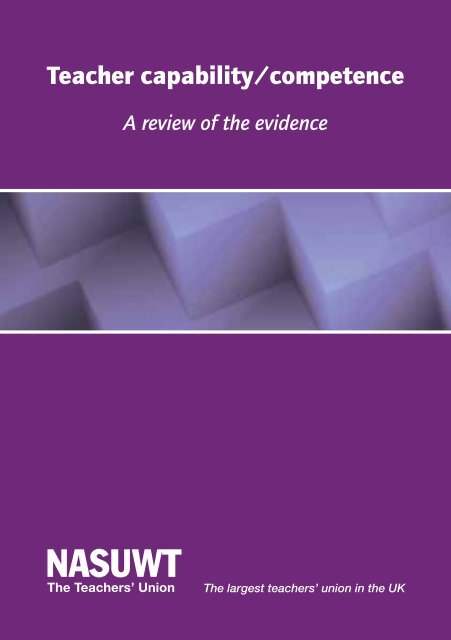

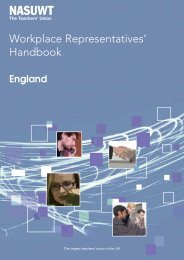

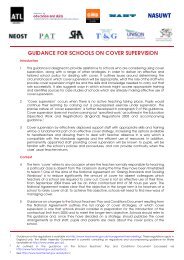

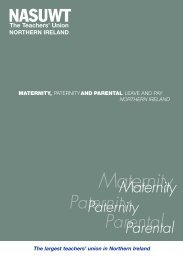
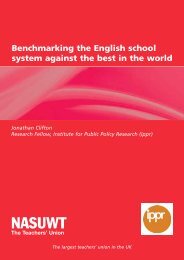
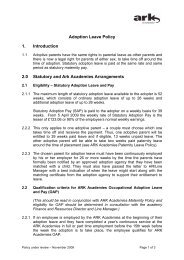
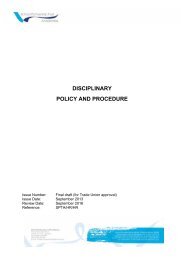
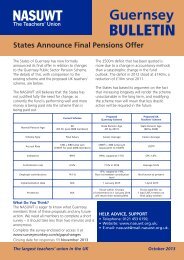
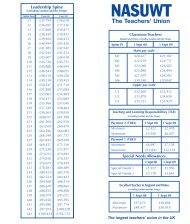

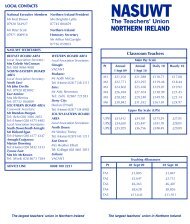
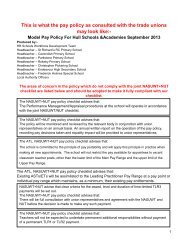
![Salaries (London & Fringe) 2012-2013 [pdf - 281 kb] - NASUWT](https://img.yumpu.com/47816007/1/190x112/salaries-london-fringe-2012-2013-pdf-281-kb-nasuwt.jpg?quality=85)